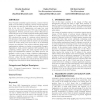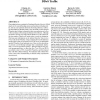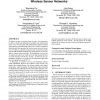93
Voted
CCS
2003
ACM
15 years 6 months ago
2003
ACM
We describe a new, general approach for safeguarding systems against any type of code-injection attack. We apply Kerckhoff’s principle, by creating process-specific randomized ...
82
Voted
CCS
2003
ACM
15 years 6 months ago
2003
ACM
Since IP packet reassembly requires resources, a denial of service attack can be mounted by swamping a receiver with IP fragments. In this paper we argue how this attack need not ...
78
Voted
CCS
2003
ACM
15 years 6 months ago
2003
ACM
We propose the use of “selective blocking” by “blocker tags” as a way of protecting consumers from unwanted scanning of RFID tags attached to items they may be carrying or...
61
Voted
CCS
2003
ACM
15 years 6 months ago
2003
ACM
CCS
2003
ACM
15 years 6 months ago
2003
ACM
We propose a new notion of cryptographic tamper evidence. A tamper-evident signature scheme provides an additional procedure Div which detects tampering: given two signatures, Div...
CCS
2003
ACM
15 years 6 months ago
2003
ACM
This paper addresses the issue of identifying buffer overrun vulnerabilities by statically analyzing C source code. We demonstrate a light-weight analysis based on modeling C stri...
83
Voted
CCS
2003
ACM
15 years 6 months ago
2003
ACM
To achieve security in wireless sensor networks, it is important to be able to encrypt and authenticate messages sent among sensor nodes. Keys for encryption and authentication pu...
55
Voted
CCS
2003
ACM
15 years 6 months ago
2003
ACM
123
Voted
CCS
2003
ACM
15 years 6 months ago
2003
ACM
This paper continues the program initiated in [5], towards a derivation system for security protocols. The general idea is that complex protocols can be formally derived, starting...
CCS
2003
ACM
15 years 6 months ago
2003
ACM
Forward-secure signatures (FSSs) have recently received much attention from the cryptographic theory community as a potentially realistic way to mitigate many of the difficulties...



